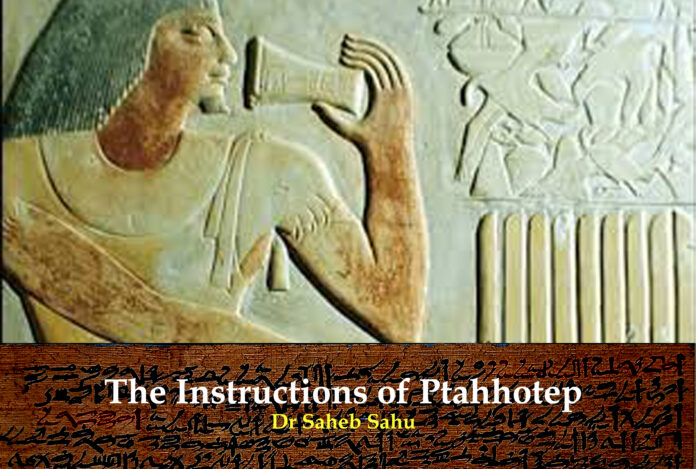Dr Saheb Sahu
Papyrus Prisse, (2375-2350BCE), Manuscript, discovered in 1847 by Egyptologist M. Parisee d’Avennes. Biblioth’eque national de France, Paris.
The Hindus believe that they invented philosophy. The Chinese believe that they perfected it. The Westerners believe that philosophy began with the Greek. But the oldest work of philosophy known to us as the ‘Instructions (or Maxims) of Ptahhotep goes back to 2375-2350 BCE, almost two thousands before Buddha, Confucius and Socrates.
Ptahhotep was Governor of Memphis, and Prime Minister (Vizier) to the Pharaoh of Egypt, during the Fifth Dynasty. It is believed that Ptahhotep was even set to succeed the Pharaoh as ruler of Egypt. But he turned down the offer. Instead, he chose to retire from public life. Retiring from office, he decided to leave his son a manual of everlasting wisdom. The Text was discovered in Thebes in 1847 by French Egyptologist M. Prisse d’ Avennes. There are four copies of the book in fragments, and the only completed version, Papyrus Prisse, is located in the Biblioth’eque National in Paris.
Ptahhoep’s book was read not only by his son, but people across Egyptian society and throughout the world’s history. His adviceon how to live well with others is as relevant and practical today as when the book was written nearly forty-five hundred years ago.
The book is a collection of maxims (maxim is a short, pithy statement expressing a general truth or rule of conduct) or guidelines on ethical or moral behavior, offering advice on how to live a good life, maintain societal harmony and navigate relationships with others, including subordinates, peers and supporters. The teachings are intended to help one to gain wisdom and to lead a balanced life.
Some Quotations from the Book:
- Be not proud because you are learned; but discourse with ignorant man as with sage. For no limit can be set to skill, neither is there any craftsman that possesses full advantages. Fair speech is more important than emerald that is found by slave-maidens on the pebbles.
- All conduct should be so straight that you can measure it with a plumb-line.
- Injustice exists in abundance, but will never succeed in the long run.
- Punish with principle, teach meaningfully. The act of stopping evil leads to the lasting establishment of virtue.
- Follow your heart all your life, do not commit excess with respect to what has been ordained.
- If you work hard, and if growth takes place as it should be in the fields, it is because God has placed abundance in hands.
- Do not gossip in your neighborhood, because people respect silent.
- Listening benefits the listener.
- God loves him who listens. He hates those who do not listen.
- Love your wife with passion.
- How wonderful is a son who obeys his father.
- Do not blame those who are childless, do not criticize them for not having any, and do not boast about having them yourself.
- May your heart never be vain because what you know? Take counsel from the ignorant as well as the wise.
- Do not repeat slanderous rumor, do not listen to it.
- Silence is more profitable than abundance of speech.
- It is foolish thing to speak on every kind of work.
- Beware of making enmity by your words.
- Wherever you go, beware of consorting with women.
- Live, therefore, in the house of kindness, and men shall come and give gifts of them.
- Make yourself to be honored for knowledge and for gentleness.
Legacy
The Instructions of Ptahhotep has had significant influence on later Egyptian literature. It offers values and social norms of ancient Egypt. It has been admired for its timeless wisdom. It is continued to be studied for its philosophical and ethical teachings. It is often compared to other ancient wisdom literature like: Upanishads and Bhagavad Gita (Hindu), Dhammapada (Buddhist), Tao te Ching and the Analects (Chinese), and books of Proverb, Job, and Ecclesiastes of the Bible (Jewish). However, all of them came many centuries later.
Sources
1- Will Durant. The Story of Civilization; Part -1. Our Oriental Heritage. Simon and Schuster; New York, 1954
2-Ass G. Hilliand et al. The Teachings of Ptahhotep; the Oldest Book in the World. Blackwood Press: Edinburg, 2012
3- Wikipedia.org/ the Maxims of Ptahhotep



